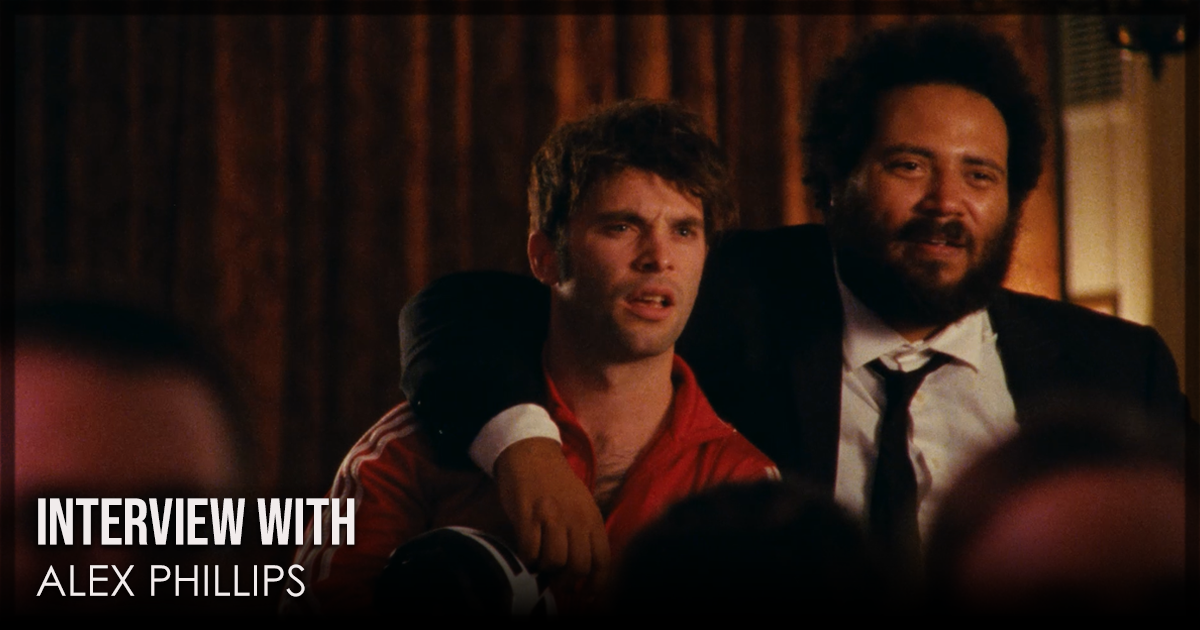Chicago-based filmmaker Alex Phillips continues to entrench himself in underground and transgressive cinema with his sophomore feature, Anything That Moves. After 2022’s All Jacked Up and Full of Worms, about people eating and getting high on these slithery creatures, he sought another potentially polarizing idea in the vein of a psychosexual thriller. However, as with his feature début, there’s a definite hint of black comedy in a story about bike-courier sex worker Liam, who is much sought-after for offering his clients more than just a pleasurable orgasm. But Anything That Moves is as much about intimacy as it is the violent spate of serial murders which Liam finds himself entangled in.
Phillips’ feature films have followed the trajectory set by his quirky and imaginative short films. These include Eel, about a third eye with Wi-Fi and an under-appreciated girlfriend, as well as Happy Place and Who’s a Good Boy? These two stories revolve around kidnappings. In the first, a student who is kidnapped by his teacher is forced to exercise while smoking and discuss Nietzsche’s philosophy. Meanwhile, in Who’s a Good Boy? A man is forced to assume the part of his kidnappers’ pet dog.
In conversation with Movies We Texted About, Phillips discussed how the film is an answer to an increasingly puritanical and fascistic society, yet he prefers to steer away from politicized art. He also discussed how empathy provokes fear and the influence of British directors Nicolas Roeg and Ken Russell.
The Interview with Alex Phillips of Anything that Moves
[Editor’s Note: This interview has been lightly edited for clarity.]
Paul Risker: How would you describe or critique your approach to filmmaking?
Alex Phillips: I guess I like to create realistic characters; people who feel authentic and lived in, who are placed in poetic and sometimes surreal and definitely heightened conflicts. I often play with genre and genre elements in order to heighten that sense of poetry and conflict, and to speak to an audience. The lived-in-character part is what allows us to connect and empathize with them on a deeper level. And the most important part of filmmaking is to create complicated characters that resonate with audiences.
These heightened circumstances, the genre and surrealism, allow us to access something deeper than just plain old realism. But there is a real artifice to realism, and if we can get rid of those clothes, then we can really get down to the raw truth or at least get closer to it.
Paul Risker: Anything That Moves will appeal to some audiences that traditionally push back against these types of transgressive subjects. I suppose the question is whether they can see that journey through.
Alex Phillips: Definitely, and this sort of disarming effect is part of the content and also part of the way that it’s constructed. What a movie should do is draw people in and take them on a journey. And you are talking about how there might be some people who are going on that journey, but they don’t want to be confronted with some of these aspects. I want everyone to have a good time, obviously, but I do know that I’m dealing with the taboo and transgressive and also horror and the erotic. And that’s not what everyone signs up for. It’s definitely not a movie for a mass audience, but there is this niche audience that will really seek it out, and there are not a lot of movies being made like this right now, whereas there have been in the past. That is something we need, especially in a time in the United States and across the world, where everything is getting much more puritanical and fascistic. This type of film that does not deal with binaries and what makes someone good and bad, but approaches every character with empathy, is something that can help the world, despite playing with transgression and horror. There’s an openness and empathy to this film, and I personally believe this is something we need more of.
Paul Risker: You say that more movies like this were made in the past. What has changed?
Alex Phillips: That’s a pretty big question. I guess the simplest answer is the corporatization of our storytelling. This isn’t a commercial movie; you can’t really sell a soda in the middle of it, and that might be part of the reason. And then, like I said, this is for a niche audience. It may also be that a lot of other films are trying to reach the biggest audience possible, and so, there might be a little bit more of a washout in terms of content and style.
Paul Risker: Do you perceive Anything That Moves as being political, and more broadly speaking, would you agree that all art is political?
Alex Phillips: I like what you said that all art is political. It’s complicated because I don’t believe in social message art. I don’t think that you should leave a film having a resolute sense of how you should vote or what you should do with your life. I don’t like dealing in binaries, and so, I don’t like that type of politicized art. But at the same time, it is a political stance to bring radical empathy to your characters and have people relate to things that they wouldn’t necessarily encounter in their everyday life. So, in that way, it’s political.
Part of the freedom of making a film in a lower budget space is that you can really stretch the content or push the limits of what you can talk about. And not to be overly simplistic, but I think art should leave people with a feeling or imbue them with emotion, as opposed to a real concrete idea. We’re not dealing in facts; we’re dealing in storytelling.
I don’t listen to songs or look at paintings to have a strict sense of things. I do it because I look at the world differently and that’s what I hope this film can do as well.
Paul Risker: What other films would you place Anything That Moves alongside? What sprung to mind for me, were British satire, oddly, and European cinema of the 1960s. What also caught my eye was the way the characters move within the physical space in a particular way that feeds the poetic and surreal tones you referenced earlier.
Alex Phillips: A British filmmaker I really like is Ken Russell—a handful of his films are major influences on me.
When you say move through the world, I don’t know whether you mean metaphorically or literally, but there are a lot of camera moves and blocking in terms of how the characters move through the space. That allows for it to feel more lived in and realistic, so that these heightened circumstances can be seen and physicalized in their bodies, which is extremely important when we’re dealing with a story about sex workers and with scenes that are all about sexual power dynamics. And shooting on film, too, adds another layer of texture that gives us a greater sense of the physical. You get grime and grit, and you can also see the glistening sweat on the characters. All of these different elements are very tangible and being based in the physical world, that can heighten the piece and speak to the greater metaphor as well.
Paul Risker: The sex scenes in Nicolas Roeg’s films remain some of the most captivating because he allowed sex to exist on its own terms and not to be convoluted by ideas of eroticism and sensuality. You appear to be trying to strike a similar note with the sex scenes in Anything That Moves.
Alex Phillips: I’m glad you brought up Nic Roeg because his work was also a major influence on the film, especially the bathtub scene [from Don’t Look Now] and the way that he plays with time and space, with his intercutting. Something cinema can do that a lot of other art forms can’t necessarily do is put us in two places at the same time.
There is still artifice to the way that the sex scenes are depicted in Anything That Moves, but it’s not necessarily for the erotic, like you said. It’s as if there’s always a complicating factor, and it’s always story-based. Even in the most heightened and possibly erotic scene when Liam is having sex with both Thea and Julia, the sisters, we get this fantastical lighting, throbbing music and camera moves. It’s still complicated and grounded by the fact that he’s haunted by this dead body that’s lying next to them in the bed that he has just seen in the bathroom.
So, there’s always going to be something in the back of these characters’ minds while they’re participating in these sex acts, and even in the purest ones, there’s something that grounds them in different and character-specific ways.
Paul Risker: It’s ironic that human beings are driven by connection and yet, sex, which is all about connection and intimacy, is so often shrouded in the taboo.
Alex Phillips: For as long as humans have been around, it seems to have been a real source of conflict. So, it’s an easy thing to turn into conflict. I think reckoning with the human body is something art has been made about ever since the beginning. But I like what you say that this is more about intimacy, and that’s the most dangerous thing about the central character. It’s why he’s sought after and the reason why he can make all of his clients glow or light up is because he can really see them. He doesn’t just deliver an orgasm but offers something that’s greater than that. And that’s what makes him sought after and also puts him in danger, because radical empathy is potentially the thing that we’re the most afraid of.
Anything That Moves recently played at the Fantasia International Film Festival.
Learn more about the film at the official Fantasia site for the title.


